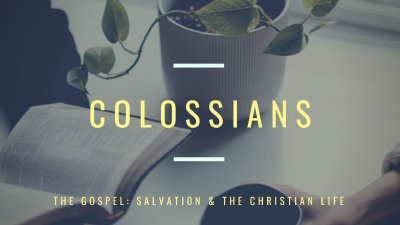


Colossians
March 28, 2021
March 28, 2021 • Pastor Phil Burggraff
Theme: Gospel Modeled Passage: Colossians 4:7–18 From the models of the Gospel Paul provides us here, we recognize Christ’s Lordship over our lives by submitting to the following directives: 1. Maintain the familial bond we have with one another 2. Display our equality with one another in service to the Lord 3. Strive to help one another thrive a. Through prayer for one another b. Through labor for one another Main Idea: We demonstrate our faith in the Gospel by our attitudes and actions toward one another. Application Questions: • Do you have someone that you can point to in your life that has modeled the Gospel for you? Describe that relationship. Are you modeling the Gospel for someone else? • What phrases and individuals in this section point to the family relationships that exist between believers? What can we do to maintain the familial bond that we possess with one another? • How does the equality that Paul describes here differ from the concept of equality in our culture and context today? What should Christian equality look like in practice? • How can we go about striving to help one another thrive in prayer and through our labor?
March 21, 2021
March 21, 2021 • Pastor Phil Burggraff
Passage: Colossians 4:2–6 Theme: Gospel Proclamation Main Idea: We must see ourselves as God’s instrument to reveal the Gospel to the world around us. Two actions to do this: 1. Pray (2–4) a. How? i. Devotedly ii. Urgently iii.Thankfully b. For what? Gospel Proclamation i. Opportunity ii. Confidence 2. Walk wisely before the world ... (5–6) a. by using your time well. b. by flavoring your speech with the Gospel. Our speech should be ... i. Grace-filled ii. Appealing iii. Appropriate Application Questions: • How would you characterize your prayer life? • How does Paul’s direction for prayer in this passage differ from your prayers? In what ways should this passage impact your prayer life? • Do you find that you spend the majority of your time around believers or unbelievers? How might vv. 5¬–6 affect your time spent among unbelievers? • Why is flavoring your speech with the Gospel important, especially in our present context? • What are some ways that you can flavor your speech with the Gospel?
March 14, 2021
March 14, 2021 • Pastor Josh Kee
Colossians 3:22-4:1 Colossians Series Main Idea: Paul elevates the lowliest (slaves/ bondservants) as the primary model for followers of Christ. Paul’s view on slavery i.. Cultural context matters ii.. “Slave” or “bondservant” – broad terms of servitude, indicating that one belonged to a master and was bound to live in obedient servitude, though conditions and terms of service varied iii. Paul, James, and Peter use the term “doulos” (slave, bondservant, or servant) to identify themselves in relation to Christ (Romans 1:1, James 1:1, 2 Peter 1:1) iv.. The gospel transforms all relationships – (Colossians 3:11; see also Philemon 15-17) v.. Paul points to those in this lowly state, dignifies them, and sets them up as examples for all believers 1. Obedience from the heart is evidence that one fears God (3:22) a. Slaves were to seek the good of their masters in everything, whether observed or not b. Mere (or begrudging) compliance is insufficient for believers in relationship to those in authority over them 2. Obedience from the heart is ultimately an act of worship (3:23) a. God observes our lives and we are to work unto him, which should improve the quality and character of the Christian’s work b. Submission to human authority is an act of faith and worship c. God’s authority stands behind human authority, so long as human representatives do not require behavior contrary to God’s character 3. Obedience from the heart flows from a heart set on Christ’s kingdom (3:24) a. Every act of submission done in faith will be rewarded by Jesus himself b. Our identity in and inheritance with Christ free us to joyful submission because we have been given the highest status as citizens of Christ’s kingdom (1:13) 4. Obedience from the heart entrusts injustice to God (3:25) a. The children of God will not ultimately be taken advantage of b. God will exact justice on all wrongdoing 5. Earthy masters are to represent God’s authority to those under their care. (4:1) God’s strategy for accomplishing his redemptive mission in the world is for every member of his church to follow Christ by taking a posture of servitude. POINT: The humility displayed in the life and death of Jesus Christ is the model of obedient servitude for every believer (David Pao). Discussion Questions: 1. How does Jesus’ humble servanthood enable a posture of servitude among his followers? Take some time to consider the following passages and allow them to lead you in worship of Jesus: Isaiah 53; Mark 10:44-45; Luke 22:42; John 1:11; John 13:1-17; Acts 4:27-28; 2 Corinthians 5:21; 8:9; Philippians 2:1-10; 1 Peter 2:21-25) 2. Are you prone to view “obedient servitude” as a non-negotiable or as an optional ideal for those who follow Christ? Explain? 3. When you consider the implications of following Christ by identifying with a slave, what about Christ’s servanthood makes you most uncomfortable? 4. Where are you most reluctant to “willingly condescend” in service to others? (Your home, workplace, the church, your “enemies”?) 5. What would the body of Christ be like if every member willingly took a servant’s posture in relationship to their brothers and sisters in Christ? How can you contribute to that kind of body? 6. Where is repentance needed in your life? In the body of Christ? How can you apply the gospel to these areas?
March 7, 2021
March 7, 2021 • Pastor Phil Burggraff
Theme: Gospel Families Passage: Colossians 3:18–21 Preliminary Observations: • Regardless of role, the Gospel calls each of us to submit to Christ’s “Lord”ship. • Despite the context, the Bible’s teaching remains relevant and right. Living out the Gospel in everyday life begins in the home as: 1. Wives submit themselves to their husband’s leading (18) 2. Husbands love their wives (19). 3. Children obey their parents in every area of their lives (20). 4. Dads invest time to understand and lead their children (21). Main Idea: Our confession that Jesus is Lord must manifest itself in our relationships with one another in our homes. Application Questions: • What does Paul’s referencing of Jesus with the title “Lord” throughout this section indicate (18, 20, 22, 23, 24)? Why do we struggle so much with worshipping Him as Lord in our homes? • How do you respond to the notion of submission? What does submission mean, and what doesn’t it mean? • Do you think there is a reciprocal relationship between the husband–wife and parent–child commands given here? How so? • How can we “embitter” our children? Why does this produce discouragement in them? What does obeying this command look like for parents and even grandparents?
February 28, 2021
February 28, 2021 • Pastor Phil Burggraff
Message Title: Gospel Unity: Putting on the New Humanity Passage: Colossians 3:12–17 Theme: Gospel unity requires that we act like who we truly are in Christ. While vv. 5–11 presented actions to remove, vv. 12–17 indicate actions that we should be displaying: 1. Put on love (12–14). a. Basis: God has chosen us, set us apart, and loved us (12a). b. Specifics: mercifulness; benevolence; humbleness; gentleness; patience (12b) c. How: Bear with each other; forgive like Christ (13). d. Result: Unified and mature community of believers (14). 2. Express Thanks (15–17). How? a. Submit to Christ’s work of peace (15). b. Focus on the Gospel in communal worship (16). c. Do everything as a personal act of worship for Jesus (17). Main Idea: Gospel unity comes when believers love one another like Christ has loved them and thankfully worship him by submitting their lives to his rule. Application Questions: • Describe what Paul means by his description of believers at the beginning of v. 12: “God’s chosen people; holy; and dearly loved.” Do you find it easy or difficult to see yourself in this light? Explain. • With which of the specifics of putting on love given in v. 12 do you struggle most? • What does bearing with and forgiving one another look like in real life? • How does Paul’s expression of thanks in vv. 15–17 differ from the practice of how we typically perceive and express thanks? • What does this passage indicate to us about worship? (note: include vv. 15 and 17 in your response, not just v. 16)
February 21, 2021
February 21, 2021 • Pastor Phil Burggraff
Passage: Colossians 3:5–11 Theme: Gospel Unity: Removal of Old Humanity Main Idea: Gospel unity requires that we act like who we truly are in Christ. What are these actions? 1. Put to death our earthly desires (3:5–7) a. Specifics: sexual immorality; impurity; lust; evil desires b. Reason: i. The covetous motivation behind these is idolatry. ii. God will pour out his wrath on those practicing such actions. iii. We have already died to these earthly desires. 2. Get rid of destructive speech (3:8): anger; rage; malice; slander; and abusive language 3. Put on the truth of who you are in Christ (3:9–11). a. The old humanity has been taken off. b. God is renewing us in knowledge so that we fully bear His image. c. Unity defines us as the new humanity in Christ. Application Questions: • If we have already died with Christ (cf. 2:11–12, 20), why is it that we are commanded to put to death the list of things in vv. 5 and 8? Why do we struggle so much with putting these to death? • How is covetousness idolatry? Is it fair to say that covetousness stands behind the other sins mentioned v. 5? Why or why not? • How do the negative commands to put to death and get rid of the actions in vv. 5 and 8 pertain especially to the community of faith (who we are as the church)? • What types of unity are mentioned in v. 11? How can we as a church and you as an individual believer cultivate these types of unity? What should this look like in our 21st century context?
February 14, 2021
February 14, 2021 • Pastor Josh Kee
Colossians 3:1-4 Colossians Series Main Idea: Christ alone is the object of the Christian’s worship. Our union with Christ in his death, burial, and resurrection is the basis of our security and hope as we await his return in glory. 1. You are raised with Christ – seek what is above (v. 1) a. Christ’s resurrection gives you a new identity and orients you to his glory b. Your identity in Christ transforms your relationship to the world 2. You died with Christ – quit focusing on temporary, earthly things (vv. 2-3a) a. Christ’s death liberates you from having to attain righteousness for yourself by human means b. Christ’s death liberates you from the threat of evil 3. You are hidden with Christ (vv. 3b-4) a. You are profoundly secure b. You will share in Christ’s glory when he returns The Christian life is wholly dependent on our union with Christ. Christian discipleship is the continuous re-orientation of our lives to the person and work of Jesus Christ. POINT: Look to Christ, keep looking to Christ, and help others look to Christ! Discussion Questions: 1. How well do you feel like you grasp what is true of you if you are in Christ? Read back through Colossians and list out everything Paul says about the Colossian believers (and therefore you by way of your union with Christ). What is your reaction to this list? Confess where you struggle with unbelief or doubt. Praise God for his promise that these things are true of you because of Christ. 2. Where are you prone to find your sense of identity? (Consider where you spend that majority of your time, energy, money, and thoughts) 3. How do Christ’s death and resurrection liberate us from having to achieve our right standing with God via our own effort, practices, or experiences? How does this change your relationship to God’s word, prayer, church attendance, etc.? 4. What is the worst that evil can do to you? How does Christ’s death free you from that threat? 5. Where are you oriented (consider your desires, thoughts, affections, behavior)? What would it look like to orient your life to Christ? How does the gospel give you hope and free you from condemnation as you make adjustments? 6. What would our church be like if each person was looking to Christ, orienting their lives to Christ, and actively helping others orient their lives to Christ? What role could you play?
February 7, 2021
February 7, 2021 • Pastor Phil Burggraff
Passage: Colossians 2:16–23 Theme: Gospel Freedom (vs. Religion) Main Idea: We must be aware of and avoid our natural tendency to improve upon the Gospel. How the Gospel is “improved”: 1. By adding religious practices (16–17) Problem: My relationship with Christ is about effects rather than the Cause 2. By requiring religious experiences (18–19) Problem: My relationship with Christ is about personal exploits rather than corporate connectedness Why these improvements don’t work: 1. They are temporal and transitory (22a). 2. They are merely human inventions (22b). 3. They are ineffective against our sinful desires (23). Gospel Point: Leave the work to Christ by submitting your life only to Him. Application Questions: • Why do you think we have this tendency to improve upon the Gospel? • How in your life have you struggled in the past (or maybe even presently) with improving the gospel by religious practices? What has this passage taught you in regard to this? • What types of religious experiences may we require to measure our relationship with Christ? How does what Paul says in v. 19 counter this? • Given what Paul says here, what do we do with all of the commands found throughout the NT that describe ethical behavior of believers in Christ? Do we still need to obey these commands? What distinguishes the ethics of a Christian life from the rules and regulations spoke of here?
January 3, 2021
January 31, 2021 • Pastor Phil Burggraff
Passage: Colossians 2:6–15 Theme: A Gospel Worldview From Colossians 2:6–15, we see two key aspects of living life according to a Gospel worldview: 1. Continue to walk with Jesus Christ (6–7). How? a. Have him as the nourishment and foundation of your life. b. Learn about him to be strengthened in the faith. c. Continually acknowledge his work in your life. 2. Be on guard for any idea other than Him (8–15). Why? a. We can be taken captive by deceptively empty ideas (8). Source: i. Human traditions ii. Spiritual Forces iii. Not Jesus Christ b. We have been filled with everything we need in Him (9–15). i. Jesus possessed the fulness of deity in himself (9). ii. Jesus stands supreme over everything (10b). iii. With Him, our flesh was crucified (11). iv. With Him, we have been raised in his resurrection (12). v. With Him, we have been made alive to experience his victory over sin and all that opposes Him (13–15). Main Idea: We must possess a Gospel worldview, that vigilantly combats our natural tendency to look for meaning in the ideas of this world, by focusing exclusively on Christ’s work for us. Application Questions: • What is a worldview? What are some popular worldviews? Why is it so important to understand what your worldview is? • Why is it that the Gospel must be at the center of our worldview? (Hint: notice in v. 6: the centrality of the Jesus Christ for initial salvation as well as the Christian life) • If we know that we must continue to walk with Jesus Christ, why is it that so few Christians are doing what Paul states in v. 6 in relation to Jesus as the pursuit of one’s life? • To what deceptive and empty “philosophies” or ideas are you susceptible? How do these affect the decisions that you make in life? • Focusing on vv. 9–15, what do we possess that gives our lives fulness because we are in Jesus Christ?
January 24, 2021
January 24, 2021 • Pastor Phil Burggraff
Theme: Gospel Servants Passage: Colossians 1:24–2:5 Main Idea: The Gospel calls us to serve in God’s glorious work. How? As God’s servants, ... 1. See your suffering as part of God’s plan (1:24). 2. Surrender your will to God’s role for you (1:25–27). 3. Strive to bring others to maturity in Christ (1:28–29). 4. Struggle to comfort one another with love found wholly in Christ (2:1-5). Application Questions: • As seen from the logic of this passage, why can Paul say that he rejoices in his sufferings (Remember that he wrote this letter from prison)? How does this impact your life as you suffer? • Does Paul’s own ministry/service in God’s plan and what motivated him, as described in vv. 25–27, apply to your life today? What is different and yet what is the same for all of us? • What does 1:28–29 teach us about the process of discipleship in church? Do you have a role to play in this discipleship process? How so? • How does Paul’s description of comfort in 2:1–3 differ from the typical understanding of comfort? In what ways should this impact your own involvement in extending comfort and compassion to others within the body of Christ?
January 17, 2021
January 17, 2021 • Pastor Phil Burggraff
Passage: Colossians 1:15–23 Theme: Jesus Christ, the Embodiment of the Gospel Main Idea: The gospel begins and ends with the person and work of Jesus Christ. 1. Jesus Christ is the supreme being in all creation (15–20). a. He is the supreme Creator of all things in creation (15–16). i. Jesus is the image of God (15a). ii. Jesus created everything, all physical and spiritual realities (15b–16a). iii. Jesus is the goal of all creation (16b) b. He is the supreme Sustainer of all things (17). i. Jesus eternally existed before anything else and thus ranks preeminent over everything. ii. Jesus sustains all that he has created. c. He is the supreme Beginning of the church (18–20). i. Just as with creation, Jesus brought the church into existence and thus serves as its head. ii. Jesus began the new creation by rising from the dead to demonstrate his supremacy over all. iii. In Jesus, the fullness of deity dwelt to reconcile all things to and for him. 2. Jesus Christ has used his supreme position to reconcile you (21–22). a. As sinners, we are alienated from God and enemies of his as demonstrated through our evil behavior (21). b. Yet, Jesus through his death on the cross has reconciled us to himself to present us holy before himself (22). Will you respond to this good news by continuing to believe, obey, and proclaim Jesus Christ (23)? Application Questions: • What emotional reactions do you have to this description of the person and work of Jesus? What things has this passage caused you to appreciate afresh about Jesus? • How should the fact that Jesus is the supreme sustainer and goal of all creation affect the way that you look at our present circumstances in America today? • What is reconciliation? In this passage, who initiates and accomplishes reconciliation? How does this differ from the typical understanding of reconciliation today? What might this mean for our treatment of others? • If Jesus has accomplished all of this for us, what is Paul trying to get us to see in v. 23? How do we continue in the faith?
January 10, 2021
January 10, 2021 • Pastor Phil Burggraff
Theme: Gospel-centered Prayer Passage: Colossians 1:3–14 Paul’s Prayer for the Colossians reveals two overarching characteristics of effective prayer: 1. Prayer should be marked by thanks for the work of the gospel in other’s lives rather than the physical blessings we may experience (1:3–8). Notice what prompts Paul’s thanksgiving: a. Believers’ faith in Jesus Christ (4a) b. Believers’ love for one another (4b) c. The hope being produced by the gospel (5–8) 2. Prayer should focus on a knowledge of God’s will so that we live a life that pleases him (1:9–14). a. Content of the prayer: Believers being filled with the knowledge of God’s will (9) b. Purpose of the prayer: Believers live a life that pleases God (10a) c. Means by which we live a life that pleases God (10b–14): i. bearing fruit in every good deed ii. growing in knowledge of God iii. being strengthened with Christ’s power to endure iv. thanking God for making you part of his kingdom through the gospel Main Idea: As we gain a knowledge of God’s will, we will live out the gospel in relationship with others. Application Questions: • Why do you suppose we don’t pray more often than we do? What excuses do you have for not praying more often? • What typifies your prayers? What are things you find yourself praying for most often? • What are the things that Paul thanks God for in this prayer (vv. 3–8)? What are the requests that he focuses on in this prayer (9–14)? How should this affect your prayers? • According to this prayer, how would you define the will of God? • What role does the gospel play in Paul’s prayer, how can it help us form our prayers?


